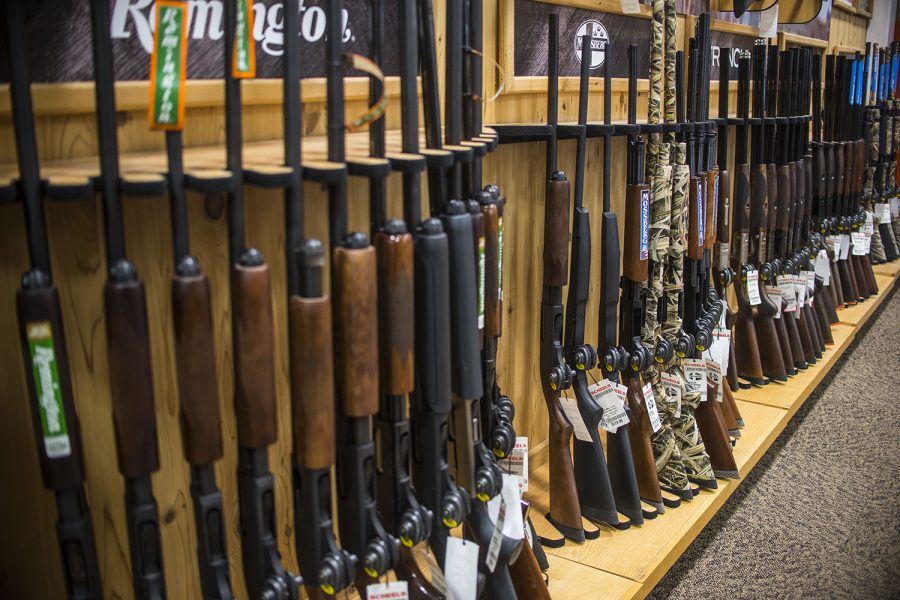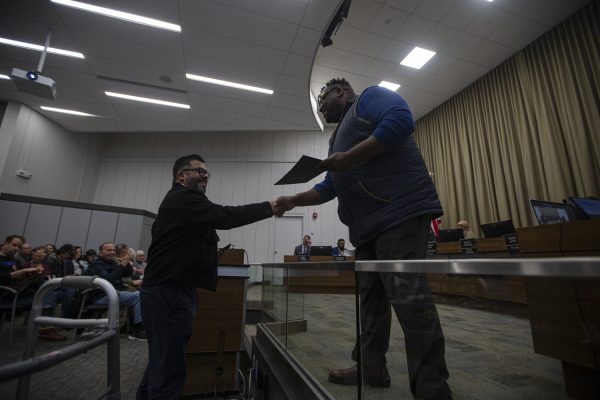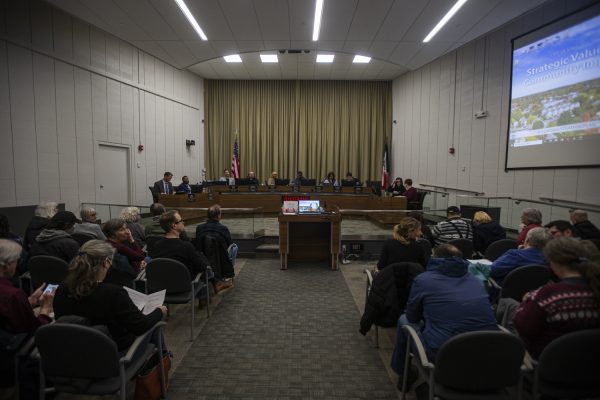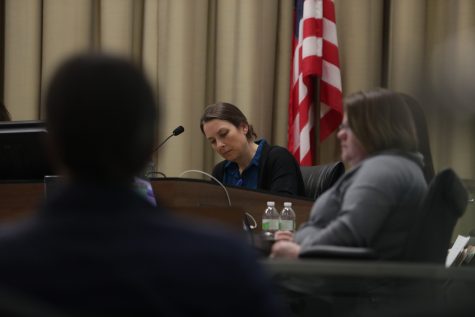Tighter state laws means more uniformity amongst local restrictions on firearms in Iowa
Following the addition of stricter consequences for cities and other local municipalities who do not comply with state firearm laws, the Iowa City City Council was forced to rescind a previous regulation on firearms in public buildings and buses.
Guns are displayed at Scheels in Coralville on Tuesday, April 11, 2018.
July 15, 2020
Iowa City and neighboring cities now have more uniformity when it comes to where residents can carry guns, but some leaders are still wary of weapons being allowed in public buildings.
The Iowa City Council reluctantly rescinded a 2011 resolution that prohibited firearms in public buildings and buses to comply with state law on July 8.
The vote followed an amendment on House File 2502 signed by Gov. Kim Reynolds that prohibited municipal localities from enacting regulations on firearms that are otherwise legal under the state.
While many Iowa City City Council members expressed frustration and disappointment with removing the prohibition, representatives from neighboring cities said they would not have to take action following the amendment, and there will be more uniformity amongst the city and state regarding the law.
Richard Rogers, a board member and volunteer lobbyist for the Iowa Firearms Coalition, said localities were originally prohibited from regulating firearms about 30 years ago on April 5, 1990 by Iowa Code 724.28, though this has been ignored in subsequent years.
The new amendment is just strengthening reinforcement of it, Rogers said.
In 2017, the legislature added to House File 2502, that if a political subdivision under the state maintains regulations like Iowa City’s former ban on firearms in public buildings and buses, the city would be liable for “declaratory and injunctive relief and all damages attributable to the violation” of a person adversely affected by the regulation.
The new amendment states the locality is also responsible for all attorney fees and court costs in prevailing cases, effective July 1.
“…This is something the legislature basically has said ‘we really, really mean it this time’ but … the bulk of this law has been in effect since April 1990,” Rogers said.
Rogers noted another change to the bill was the addition of a section which allows cities to restrict weapons in certain venues as long as security is provided.
Rogers said the importance of this section is that citizens will have a choice in being disarmed, and they will at least know that everyone else has been disarmed, instead of just trusting or relying on a sign.
Rogers said the purpose of the tighter state regulations is to create more clarity for Iowans and avoid confusion over differing locality laws.
RELATED: Iowa City City Council lifts gun ban for public buildings, buses
“… Now you can have laws against guns, but it has to be passed at the state level,” Rogers said. “The point is we’re trying to avoid an unworkable patchwork of local laws. If you have the laws vary from town to town, county to county, and park and a library, in this building but not in that building, it becomes untenable to carry a weapon.”
In an email to The Daily Iowan, Greg Buelow, Cedar Rapids public safety communications coordinator, said the city will not need to take any new actions because of the new amendments passed, as Cedar Rapids currently allows the public to carry on city property.
Coralville Mayor John Lundell said that while the city is also already in compliance with state law on the matter and won’t have to make changes in accordance, he does think the decision should be something that’s left up to local governments.
“I’m always in favor of local control for policies such as this, so I’m disappointed that the state intervened,” Lundell said. “I believe it should be a local policy set by local elected officials.”
Lundell added that the city library currently has restrictive laws regulating firearms, but the policies of the library are under the jurisdiction of the library board by state law, as opposed to the City Council.
Lundell said he thinks the library would look at complying with whatever the state law is. He added that he doesn’t think the added measures will increase safety.
“I’m sure there’s people that would answer both ways … but I don’t feel comfortable being around citizens who are carrying weapons,” Lundell said.
Nancy Bird, executive director of the Iowa City Downtown District, said one of the Downtown District’s advocacy points is to prohibit legal gun-carrying on the Pedestrian Mall or in the playground area, which has already been allowed for years.
While she doesn’t think the recent lift of gun bans in public buildings and buses will have much of an effect on the Downtown District, Bird said it was the same type of ban they’ve been trying to get in the Pedestrian Mall because of the playground.
“I think it’s certainly a step backwards,” Bird said. “Those were in place for a reason, and like I said we were advocating to really help create a safe environment on the Pedestrian Mall and by the playground as well, and we haven’t won that battle.”
Moving forward, Bird said the Downtown District is continually trying to progress and provide the safest community possible.
“There’s so many other things right now that are pressing, it’s hard to know exactly what to pursue first, but we’re really focused right now on just trying to figure out the next steps related to the COVID impacts and support of the Black Lives Matter movement,” Bird said. “This has been a piece of that, but I think we’re challenged to know how to make progress in that area.”















